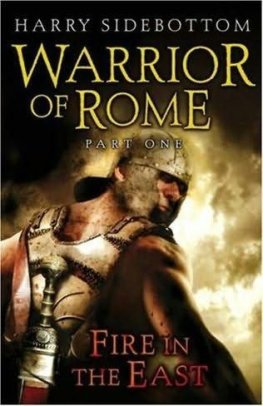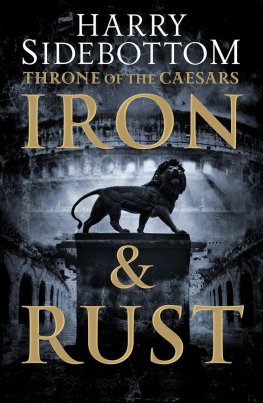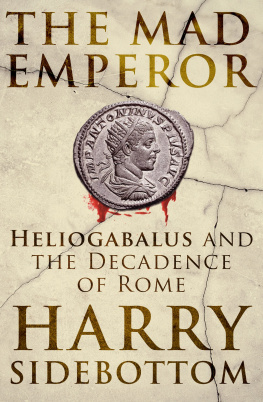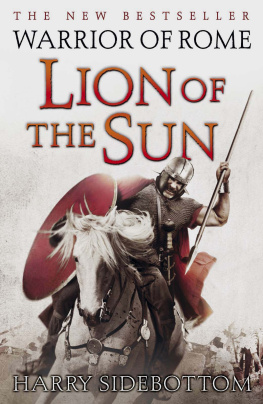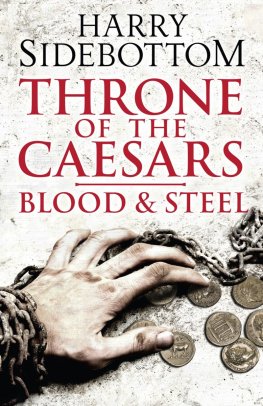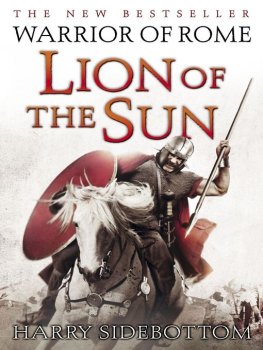Harry Sidebottom - Fire in the East
Here you can read online Harry Sidebottom - Fire in the East full text of the book (entire story) in english for free. Download pdf and epub, get meaning, cover and reviews about this ebook. genre: Adventure. Description of the work, (preface) as well as reviews are available. Best literature library LitArk.com created for fans of good reading and offers a wide selection of genres:
Romance novel
Science fiction
Adventure
Detective
Science
History
Home and family
Prose
Art
Politics
Computer
Non-fiction
Religion
Business
Children
Humor
Choose a favorite category and find really read worthwhile books. Enjoy immersion in the world of imagination, feel the emotions of the characters or learn something new for yourself, make an fascinating discovery.
- Book:Fire in the East
- Author:
- Genre:
- Rating:5 / 5
- Favourites:Add to favourites
- Your mark:
- 100
- 1
- 2
- 3
- 4
- 5
Fire in the East: summary, description and annotation
We offer to read an annotation, description, summary or preface (depends on what the author of the book "Fire in the East" wrote himself). If you haven't found the necessary information about the book — write in the comments, we will try to find it.
Fire in the East — read online for free the complete book (whole text) full work
Below is the text of the book, divided by pages. System saving the place of the last page read, allows you to conveniently read the book "Fire in the East" online for free, without having to search again every time where you left off. Put a bookmark, and you can go to the page where you finished reading at any time.
Font size:
Interval:
Bookmark:
Harry Sidebottom
Fire in the East
'And let them, when besieging a fortress, strive to win over whomsoever possible of those inside the fortress and the city, in order to attain through them two things: one the drawing out of their secrets, and the other intimidating and frightening them through themselves. And [let] a man be sent by underhand means who should unsettle their minds, and deprive them of any hope for succour, and who should tell them, that their sly secret is unravelled, and that tales are told about their fortress, and that fingers are pointed at their fortified and weak places and at the places against which battering-rams will be directed, and at the places where mines will be conducted, and at the places where ladders will be placed, and at the places where the walls will be ascended, and at the places where fire will be set in order that all these should fill them with terror'
- Fragment from the Sassanid Book of Ayin; translation James [2004], 31Prologue (Summer AD238)
War is hell. Civil war is worse. This civil war was not going well. Nothing was going to plan. The invasion of Italy had ground to a halt.
The troops had suffered crossing the Alps before the spring sunshine had melted the snows in the passes. They had expected to be welcomed as liberators. They had been told that they only need set foot in Italy for everyone to come running, holding out olive branches, pushing forward their children, begging for mercy, falling at their feet.
It had not happened as they had hoped. They had come down from the mountains into an empty landscape. The inhabitants had fled, taking with them everything that they could move. Even the doors of their houses and temples were gone. The normally bustling plains were deserted. As the soldiers passed through the city of Emona the only living thing they found was a pack of wolves.
Now the army had been camped for over a month outside the walls of the north Italian city of Aquileia. The legions and auxiliaries were hungry, thirsty and tired. The hastily improvised supply chain had broken down. There was nothing to be had locally. What the citizens had not gathered within the walls, the soldiers themselves had wasted when they first arrived. There was no shelter. All the buildings in the suburbs had been torn down to provide materials for siege works. The river was polluted with the corpses of both sides.
The siege was making no progress. The walls could not be breached; there were not enough siege engines, the defenders were too effective. Each attempt to storm the walls with siege ladders and mobile towers ended in bloody failure.
Yet you could not fault the big man's courage. Every day the Emperor Maximinus Thrax would ride around the town, well within bowshot range of the enemy, calling out encouragement to his men in the siege lines. As he passed through the ranks he promised them the town and everyone in it to do with as they pleased. While his courage had never been in doubt, his judgement had always been suspect. Now with every new reverse he became more savage. Like a wounded animal or, as many said, like the half-barbarian peasant he would always remain, he struck out at those around him. The officers who led the doomed attempts to scale the wall were executed in ever more inventive ways. Especial ingenuity was reserved for those from the nobility.
Ballista was even more hungry, thirsty and dirty than most. He was a tall youth, only sixteen winters and over six foot, and still growing. No one felt the lack of food more keenly than he did. His long blond hair hung lank down his back. A residual squeamishness held him back from washing on the riverbank. Since yesterday, a smell of burning, a reek of charred flesh, had joined the other odours which hung about him.
Despite both his youth and his status as a diplomatic hostage for his tribe, it had been considered by everyone the right thing that one of his birth, one of the Woden-born, should lead one of the units of German irregulars. The Romans had calculated the height of the wall, they had issued ladders of the correct length and, with Ballista at the front, the five hundred or so expendable barbarians had been sent off. The men had advanced at a jog, bent forward into the storm of missiles. The large bodies of the Germans and their lack of armour had made them good targets. Again and again there was a sickening sound as a missile struck home. They had fallen in droves. The survivors had pushed on in brave style. Soon the smooth walls had towered above them. More had fallen as they put aside their shields to raise the ladders.
Ballista had been one of the first to mount. He had started to climb one-handed, his shield held above him, his sword still in its scabbard. A falling stone had hit the shield, almost knocking him off the ladder. The noise was indescribable. He saw a long pole appear over the wall and push out over the next ladder along. At the end of the pole was a large amphora. Slowly the pole was turned, the amphora tipped, and a flaming mixture of pitch and oil, sulphur and bitumen poured like rain on to the men on the ladder. Men screamed, their clothes burning and shrinking, clinging to them, their flesh roasting. One after another they fell from the ladder. The incendiary liquid splashed out over those at its foot. They beat at the flames with their hands, rolled themselves on the ground. There was no way to put out the flames.
When Ballista looked up there was another amphora above his head, its pole beginning to turn. With no hesitation Ballista threw himself from the ladder. He landed hard. For a moment he thought that his ankle was broken or turned and that he would be burnt alive. But self-preservation had overcome the pain and, yelling for his men to follow him, he ran away.
Ballista had been thinking for some time that a conspiracy was inevitable. Impressed as he was by Roman discipline, no body of fighting men would put up with this siege for long. And after the disaster that day, he had not been surprised when he was approached.
Now, as he waited to play his part, he realized the depth of his fear. He had no wish to play the hero. Yet he had no real choice. If he did nothing, either Maximinus Thrax would execute him or the conspirators murder him.
The conspirators had been right. There were very few guards around the imperial tent. Many of those present were asleep. It was the drowsy time just after midday. The time when the siege paused. The time when the emperor and his son rested.
A nod from one of the conspirators, and Ballista set off towards the huge purple tent with the standards outside. Suddenly he was very aware of what a beautiful day it was; a perfect Italian early June day, hot with a light breeze. A honey bee buzzed across his path. Swallows were wheeling high above.
A praetorian guardsman blocked Ballista's way with his spear. 'Where do you think you are going, barbarian?'
'I need to talk to the emperor.' Ballista spoke reasonable if heavily accented Latin.
'Who does not?' The praetorian was uninterested. 'Now fuck off, boy.'
'I have information of a conspiracy against him.' Ballista dropped his voice. 'Some of the officers, the nobles, are plotting to kill him.' He watched the guardsman's evident indecision. The potential danger of not passing on to a suspicious and vengeful emperor news of a possible conspiracy eventually overcame the natural fear of waking an increasingly short-tempered and violent man for whom things were not going well.
'Wait here.' The praetorian summoned a fellow soldier to watch the barbarian and disappeared into the tent.
He reappeared in short order and told the other praetorian to disarm and search the barbarian youth. Having given up his sword and dagger, Ballista was ushered into the tent; first into an antechamber, then into the inner sanctum.
Font size:
Interval:
Bookmark:
Similar books «Fire in the East»
Look at similar books to Fire in the East. We have selected literature similar in name and meaning in the hope of providing readers with more options to find new, interesting, not yet read works.
Discussion, reviews of the book Fire in the East and just readers' own opinions. Leave your comments, write what you think about the work, its meaning or the main characters. Specify what exactly you liked and what you didn't like, and why you think so.

